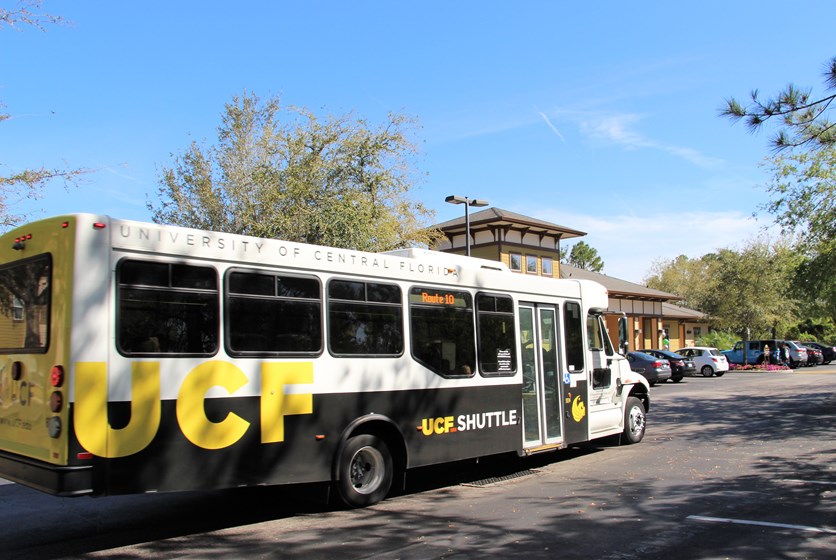Deciding whether to rent an apartment in close proximity to University of Central Florida’s campus or commute from home can be challenging. This decision is one that can be pivotal in your college experience, making it that much more important to weigh both options fairly. We’ve compiled a list of some things you should consider before making your decision:

Cost of Renting an Apartment near UCF vs. Commuting to Campus
Aside from the price of rent, there are a variety of other costs that need to be considered when living in an apartment. We recommend calculating your costs by a monthly or per semester basis to develop a clear picture of what you’ll be paying in all. Consider a budget that analyzes your costs holistically, which likely includes…
Rent with Utilities and Fees
The costs below can fluctuate depending on how close, or far, you are to UCF’s campus. For example, off-campus apartments near UCF further away from campus may entice you to live with them by offering discounted fees or unique pricing packages. Their plans may already include internet and cable, or you may get free parking. Whatever the case, it is still important to note all potential costs, some of which can be seen below:
- Internet and Cable
- Water
- Electricity
- Renter’s Insurance
- Parking
Note: The cost of Parking tends to be higher for apartments that are in closer proximity to campus.
Commuting Expenses
These costs will vary depending on how far your commute is/how much mileage you will be putting on your car. For individuals that live further from campus, say 15 to 20 minutes, their allotted budget for gas will be higher because they have to travel longer distances. However, commuting expenses can always be lowered if you utilize public transportation options, such as the SunRail or UCF Express Shuttle. Here are some things you can consider as commuting expenses:
- Gas
- Tolls
- Car maintenance, including oil changes and replacing your air filter.
UCF Parking
Commuting students are required to
purchase a Student “D” parking permit to park on UCF’s campus for Fall and Spring semester. For a One-Semester permit, it is $47.94 for the Decal and $50.35 for the Hang Tag (In all, $98.29). For a Multi-Semester Permit, it is $95.88 for the Decal and $100.68 for the Hang Tag (Total, $196.56). If you are planning to commute both Fall and Spring semester, it makes more sense financially to purchase a Multi-Semester Permit and be free of worry for the entire school year!
Food

- For individuals living in an apartment, consider monthly grocery expenses. Now that you’re living off-campus, you may have said goodbye to your dining membership at ’63 South or Knightro’s. You will need funding to purchase groceries at your local Publix to start making your own meals in the comfort of your new home.
- For individuals commuting, consider eating-out expenses. Being constantly on the go, you are more likely to stop for quick bites to eat to-and-from your commute. On the days you don’t have time to make a meal at home, consider your expenses going towards a turkey sub at Wawa or a healthier
alternative at Designer Greens.
Emergency Fund
Be smart! Stick to your budget and don’t overspend in the event of an emergency that we haven’t accounted for above.
Time Spent Commuting to UCF Campus
After analyzing all of your costs, you must weigh in another important factor, which is time. As a student, you know that time is of value, and there are only so many hours in a day. Time management is an important skill to learn right off the bat so that you aren’t late to classes, meetings, and other obligations. Some questions to ask yourself to get the best use of your time are:
How long will it take to get to and from UCF’s campus?
- You can expect heavy traffic at UCF during the first few weeks of the semester. Also, there is known to be traffic during rush hours on the major highways leading to UCF’s campus.
- Finding a parking spot on campus also presents its challenges. Especially in your first few weeks, allot extra time to figure out the best places for parking.
- There are always going to be unexpected delays in addition to the ones mentioned above. Try mapping your route utilizing Google Maps beforehand and then allow yourself a safety net in your commute to campus.
How many times per week will you need to make the commute?
- When commuting, it might be a smart idea to schedule your classes for Monday/Wednesday/Friday or Tuesday/Thursday so that you won’t be spending a lot of time transporting on a weekly
basis.
How does the time spent commuting affect other aspects of your life?
- This question is something that will vary from person to person. Potentially, the time spent driving to and from UCF’s campus could inhibit you from other things. If you’re spending excessive amounts of time daily in the car, you might have to sacrifice hours at your job, time studying, or doing other things you enjoy. It could also mean your social life is on the back-burner. However you spend your day, make sure that the time you spend commuting is worth the trade.

"The College Experience"
Either way, whether you decide to commute from home or stay in an apartment near campus, your overall college experience will reflect that decision. For some, a crucial part of their college experience is the independence and freedom that comes with living in a college apartment. For others, saving money and spending valuable time with their family is desirable. Regardless, our time spent at university is considered some of the best, and most influential, years of our lives. It is a unique experience for everyone, making it that much more important you truly consider what is most important to you prior to making your decision. Consider some of the following:
- Will either living situation put you in financial distress?
- Are you more likely to miss out on major events on and around campus because of your living situation? Will attending football games, or going out with friends, be affected by your decision?
- Will you still feel like a part of the UCF family in your living situation?
Don’t forget that your initial decision doesn’t need to be your last! If you come to the realization, say after a semester or two, that you’d rather live in an apartment near UCF (or vice versa), then don’t hesitate to make the switch! The most important thing to consider when making your decisions is what is best for YOU. There is no right answer, so do what makes you feel the most secure and comfortable with your living situation. We hope you utilize this guide to help you sort through some of the factors that should be considered before ultimately making a decision. We wish you the best of luck in your living situations!
« Back: UCF Student Guide